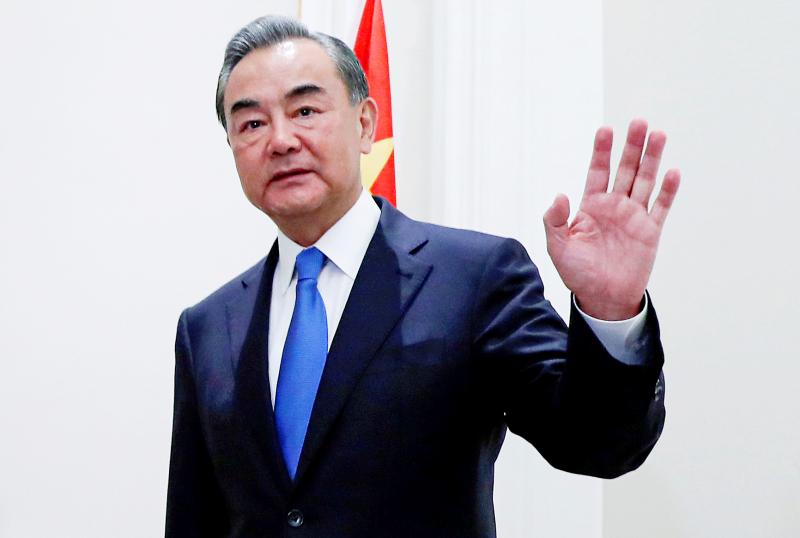French and German officials yesterday criticized Chinese Minister of Foreign Affairs Wang Yi (王毅) over a threat he issued because of Czech Senate President Milos Vystrcil’s visit to Taiwan.
Wang was on a five-nation visit to Europe to counter US pressure on issues such as democracy in Hong Kong and data security regarding apps such as TikTok and WeChat, which US President Donald Trump is seeking to ban.
However, Wang’s trip was overshadowed by comments he made on Monday, when he called Vystrcil’s visit to Taiwan a “provocation” and said that the senate president would “pay a heavy price.”

Photo: Reuters
French Ministry of Foreign Affairs spokeswoman Agnes von der Muhll on Tuesday said that the Europe-China relationship must be based on the principle of dialogue and reciprocity, as well as mutual respect, and that the EU would not accept threats made to one its member countries, French media reported.
German Minister of Foreign Affairs Heiko Maas echoed the sentiment, saying that while the EU welcomed foreign partnerships, it expected respect from them.
“Threats have no place here [in Europe],” Maas said.
Europe must be confident in its protection of its own interests and must avoid becoming a puppet of powerful nations like the US, Russia or China, he said, adding that he had communicated Germany’s support for the Czech Republic to Czech Minister of Foreign Affairs Tomas Petricek.
Maas also criticized China over human rights abuses, including mass internment of Uighurs in camps in Xinjiang and its implementation of national security legislation in Hong Kong.
Maas called on China to redact the Hong Kong legislation, to implement universal suffrage in the territory and to uphold its “one China, two countries” framework that promises a high degree of autonomy to Hong Kong and Macau.
However, Wang said that Xinjiang and Hong Kong were China’s internal matters and that foreign interference was unwelcome.
Slovak President Zuzana Caputova also spoke out about Wang’s threat to Vystrcil, tweeting that “#Slovakia stands by the Czech Republic. #EU-#China relations are based on dialogue and mutual respect.”
Slovakia and the Czech Republic were previously one nation, Czechoslovakia, but separated in 1993 and today maintain close ties.
“Threats directed at one of the EU members and its representatives contradict the very essence of our partnership and as such are unacceptable,” Caputova wrote.
Meanwhile, European Commission foreign affairs spokesman Peter Stano said that he was “unhappy to see such diplomatic language,” and that China and the Czech Republic should engage in dialogue.
The EU and China would continue to discuss Taiwan, Hong Kong and other issues, Stano said.

A Ministry of Foreign Affairs official yesterday said that a delegation that visited China for an APEC meeting did not receive any kind of treatment that downgraded Taiwan’s sovereignty. Department of International Organizations Director-General Jonathan Sun (孫儉元) said that he and a group of ministry officials visited Shenzhen, China, to attend the APEC Informal Senior Officials’ Meeting last month. The trip went “smoothly and safely” for all Taiwanese delegates, as the Chinese side arranged the trip in accordance with long-standing practices, Sun said at the ministry’s weekly briefing. The Taiwanese group did not encounter any political suppression, he said. Sun made the remarks when

The Taiwanese passport ranked 33rd in a global listing of passports by convenience this month, rising three places from last month’s ranking, but matching its position in January last year. The Henley Passport Index, an international ranking of passports by the number of designations its holder can travel to without a visa, showed that the Taiwan passport enables holders to travel to 139 countries and territories without a visa. Singapore’s passport was ranked the most powerful with visa-free access to 192 destinations out of 227, according to the index published on Tuesday by UK-based migration investment consultancy firm Henley and Partners. Japan’s and

BROAD AGREEMENT: The two are nearing a trade deal to reduce Taiwan’s tariff to 15% and a commitment for TSMC to build five more fabs, a ‘New York Times’ report said Taiwan and the US have reached a broad consensus on a trade deal, the Executive Yuan’s Office of Trade Negotiations said yesterday, after a report said that Washington is set to reduce Taiwan’s tariff rate to 15 percent. The New York Times on Monday reported that the two nations are nearing a trade deal to reduce Taiwan’s tariff rate to 15 percent and commit Taiwan Semiconductor Manufacturing Co (TSMC, 台積電) to building at least five more facilities in the US. “The agreement, which has been under negotiation for months, is being legally scrubbed and could be announced this month,” the paper said,

MIXED SOURCING: While Taiwan is expanding domestic production, it also sources munitions overseas, as some, like M855 rounds, are cheaper than locally made ones Taiwan and the US plan to jointly produce 155mm artillery shells, as the munition is in high demand due to the Ukraine-Russia war and should be useful in Taiwan’s self-defense, Armaments Bureau Director-General Lieutenant General Lin Wen-hsiang (林文祥) told lawmakers in Taipei yesterday. Lin was responding to questions about Taiwan’s partnership with allies in producing munitions at a meeting of the legislature’s Foreign Affairs and National Defense Committee. Given the intense demand for 155mm artillery shells in Ukraine’s defense against the Russian invasion, and in light of Taiwan’s own defensive needs, Taipei and Washington plan to jointly produce 155mm shells, said Lin,